|
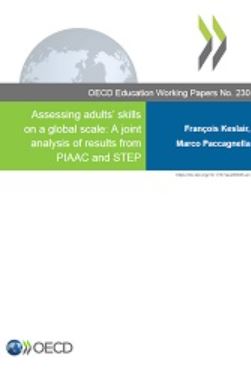 [Summary courtesy OECD] [Summary courtesy OECD]
Assessing adults’ skills on a global scale: A joint analysis of results from PIAAC and STEP
This paper illustrates similarities and differences between two international surveys that assess adults’ skills: the Programme for the International Assessment of Adult Competencies (PIAAC) and the Skills Towards Employment and Productivity (STEP) survey. In particular, the paper highlights the issues that can arise for researchers interested to jointly analyse the data from the two surveys and to compare their results. The paper finds that, in spite of the many similarities, important differences exist between PIAAC and STEP, both in the way the data are collected, and in the way the proficiency of respondents is estimated. These issues can indeed affect the cross-country comparability of results from the two surveys. There is [however] little evidence that the literacy assessment used in the two surveys is not adequate to form a basis for a valid assessment of adults’ proficiency on a global scale.
» Download the PDF
» OECD iLibrary
|
|
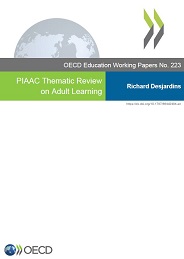 [Summary courtesy OECD] [Summary courtesy OECD]
PIAAC Thematic Review on Adult Learning
This report focuses on the adult learning data that was collected as part of the OECD Survey of Adult Skills between 2012 and 2016, which has been a core activity of the ongoing OECD Programme for the International Assessment of Adult Competencies (PIAAC). The objectives are to: present the data on adult learning made available by PIAAC; provide an international and comparative overview of the extent of adult learning of different types along with trends, where possible, for countries and economies that have so far participated in PIAAC; reveal international and comparative patterns on the distribution of adult learning within participating countries and economies, focusing on who is and who is not participating in terms of the types of jobs they work in as well as their socio-demographic profile; assess empirically the relationship between some types of adult learning and economic as well as social outcomes; discuss systemic features of adult learning systems and their relationship with selected economic and social policy instruments; and to draw out implications of the results in relation to the continued measurement of adult learning.
» Download the PDF
» OECD iLibrary
» Access the tables and charts (Webpackages)
|
|
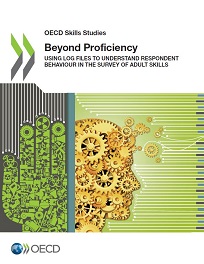 [Summary courtesy OECD] [Summary courtesy OECD]
Beyond Proficiency - Using Log Files to Understand Respondent Behaviour in the Survey of Adult Skills
Computer-based administration of large-scale assessments makes it possible to collect a rich set of information on test takers, through analysis of the log files recording interactions between the computer interface and the server. This report examines timing and engagement indicators from the Survey of Adult Skills, a product of the Programme for the International Assessment of Adult Competencies (PIAAC), both of which indicate large differences across countries and socio-demographic groups, in the amount of time spent by respondents and their levels of disengagement, which reduce the probability of giving a correct answer and consequently reduces measured performance. Such insights can help policy makers, researchers, and educators to better understand respondents’ cognitive strategies and the underlying causes of low and high performance. This, in turn, can help improve the design of assessments and lead to more effective training and learning programmes.
» Download the PDF
» OECD iLibrary
|
|
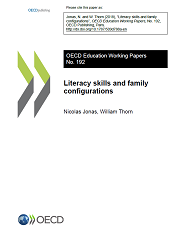 [Summary courtesy OECD] [Summary courtesy OECD]
Literacy Skills and Family Configurations
We study the links between family configuration and formation on the one hand and adult literacy skills on the other by analysing data from the Programme for the International Assessment of Adult Competencies (PIAAC), a survey of 250,000 people aged 16 to 65 conducted by the OECD in 33 countries and economies. Literacy proficiency has an effect on many aspects of the formation and development of families, such as age of parents at birth of first child, or age of partners at cohabitation, even when educational attainment and age are taken into account. Moreover, having children and living with a partner have consequences for adults’ job opportunities and participation in the labour market, which can be particularly negative for the women with the highest literacy proficiency.
» Download the PDF
» OECD iLibrary
|
|
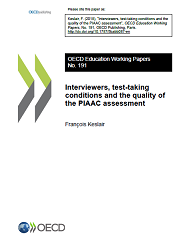 [Summary courtesy OECD] [Summary courtesy OECD]
Interviewers, Test-Taking Conditions and the Quality of the PIAAC Assessment
This paper explores the impact of test-taking conditions on the quality of the Programme for the International Assessment of Adult Competencies (PIAAC) assessment. Interviewers record information about the room of assessment and interruptions that occurred during each interview. These observations, along with information on interviewer assignment size and a careful look at interviewer effects, provide insights into the quality of the assessment. This working paper first describes the variations in test-taking conditions among participating countries. Second, it examines interviewer assignment sizes and the frequency of interruptions, finding that both vary markedly among countries (contrary to the room of assessment). The paper then looks at the relationship between these variations and response rates and engagement measures. While neither the room of assessment nor the recorded interruptions impact quality differences among countries, interviewer assignment size and interviewer effects may have a mild impact on results.
» Download the PDF
» OECD iLibrary
|
|
 [Summary courtesy OECD] [Summary courtesy OECD]
Skills on the Move: Migrants in the Survey of Adult Skills
Migration has been at the centre of political debate across the OECD in recent years. This report provides new evidence based on PIAAC data on differences in migrants’ characteristics and considers how these [differences] relate to the skills migrants possess. It also examines the relationship between migrants’ skills and their labour- and non-labour-market outcomes in host countries. Finally, it sheds new light on how migrants’ skills are developed, used, and valued in host-country labour markets and societies.
» Download the PDF
» OECD iLibrary
|
|
 [Summary courtesy OECD] [Summary courtesy OECD]
Numeracy Practices and Numeracy Skills among Adults (Education Working Papers, No. 177)
We assess the relationship between numeracy skills and numeracy practices among adults in everyday life and at work from the Survey of Adult Skills, a product of the Programme for the International Assessment of Adult Competencies (PIAAC), an international survey of about 250,000 adults aged 16 65 years old conducted by the OECD in 33 countries/economies. The level of proficiency and the intensity of engagement in numeracy practices are two embedded aspects of numeracy. Proficient adults use numeracy frequently, and adults who regularly engage in numeracy practices improve their performance. Individual and contextual factors influence, in different ways across countries, the strength of these links. The intensity of the use of numeracy in everyday life decreases as the lapse of time since a person’s studies increases. Moreover, employed people engage in mathematical activities less in the private setting if they do not [engage in them] intensively in the workplace.
» Download the PDF
» OECD iLibrary
|
|
 [Summary courtesy OECD] [Summary courtesy OECD]
Skills for the 21st Century: Findings and Policy Lessons from the OECD Survey of Adult Skills (Education Working Papers, No. 166)
The OECD Survey of Adult Skills is the jewel in the crown of its Programme for the International Assessment of Adult Competencies (PIAAC). This paper argues that the findings and policy lessons from the project to date justify the high hopes which were placed in PIAAC when detailed planning for the project began in 2003. First, it presents a brief recap of PIAAC and its two predecessor international skills surveys. Second, it outlines the main themes which have been investigated to date using data from PIAAC. Third, the main findings and policy lessons drawn from PIAAC are highlighted. Finally, looking forward to the second cycle of PIAAC, for which planning is now underway, the paper suggests some priority areas for improvement to the survey design in order to add to its analytical usefulness and enhance its utility to policy makers.
» Download the PDF
» OECD iLibrary
|
|
 [Summary courtesy OECD] [Summary courtesy OECD]
Association Between Literacy and Self-Rated Poor Health in 33 High- and Upper-Middle-Income Countries (Education Working Papers, No. 165)
We assess the relationship between general literacy skills and health status by analysing data from the PIAAC, an international survey of about 250,000 adults aged 16 65 years conducted by the OECD from 2011 15 in 33 countries/national sub-regions. Across countries, there seems to be a strong and consistent association between general literacy proficiency and self-rated poor health, independent of prior socioeconomic status and income. General literacy proficiency also appears to be a mediator of the association between self-education and self-rated poor health. While the literacy-health association is robust over time, it varies in magnitude across countries. It is strongest for those with a tertiary or higher degree and does not appear to exist among young adults (ages 25 to 34 years). Future studies are required to understand the contextual factors that modify the general literacy proficiency-health association.
» Download the PDF
» OECD iLibrary
|
|
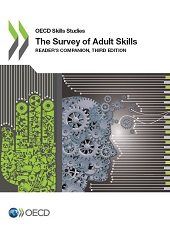 [Summary courtesy OECD] [Summary courtesy OECD]
The Survey of Adult Skills: Reader’s Companion, Third Edition
The Survey of Adult Skills: Reader’s Companion, Third Edition, describes the design and methodology of the survey and its relationship to other international assessments of young students and adults. It is a companion volume to “Skills Matter: Additional Results from the Survey of Adult Skills”.
» Download the PDF
» OECD iLibrary
|
|

Skills Matter: Additional Results from the Survey of Adult Skills (Round 3)
Based on the results from the 33 countries and regions that participated in the 1st and 2nd round of the Survey of Adult Skills in 2011-12 and in 2014-15, this report describes adults’ proficiency in three information-processing skills, and examines how proficiency is related to labour-market and social outcomes. It places special emphasis on the results from the 3rd and final round of the first cycle of PIAAC in 2017-18, which included 6 countries (Ecuador, Hungary, Kazakhstan, Mexico, Peru and the United States).
» Download the PDF
» OECD iLibrary
» Access the tables and charts (Webpackages)
 Literacy, Numeracy and Problem Solving in Technology-Rich Environments – Framework for the OECD Survey of Adult Skills Literacy, Numeracy and Problem Solving in Technology-Rich Environments – Framework for the OECD Survey of Adult Skills
This report maps the development of the Survey of Adult Skills, from determining what should be measured, to defining the meaning of PIAAC’s three core domains—“literacy,” “numeracy,” and “problem solving in technology-rich environments”—to designing assessment tasks and determining how those tasks will be interpreted. It summarizes the draft frameworks developed by dedicated experts for each of the assessment domains, and includes examples of the items and stimuli used to measure proficiency in the three domains. In essence, it provides an overview and a look at the underpinnings of PIAAC
» Download the PDF
» OECD iLibrary
|
|
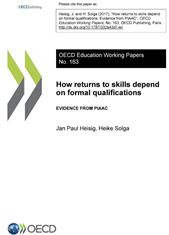 [Summary courtesy OECD] [Summary courtesy OECD]
How Returns to Skills Depend on Formal Qualifications – Evidence from PIAAC (Education Working Papers, No. 163)
Using PIAAC (Programme for the International Assessment of Adult Competencies) data for 21 countries, we study interrelationships between formal qualifications, cognitive skills, and labour market outcomes, focusing on comparisons between less- and intermediate-educated adults (i.e. between adults with a degree below the upper secondary and at the upper secondary level). Less-educated adults tend to have lower cognitive skills than intermediate-educated adults, yet both groups are internally heterogeneous. In country-specific individual-level regressions, cognitive skills partly explain the lower occupational status of less-educated adults, but cross-national variation in their disadvantage remains substantial after accounting for skills.
» Download the PDF
» OECD iLibrary
|
|
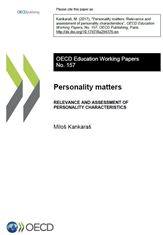 [Summary courtesy OECD] [Summary courtesy OECD]
Personality Matters: Relevance and Assessment of Personality Characteristics (Education Working Papers, No. 157)
This paper reviews the scientific literature covering a wide range of personality characteristics, discussing their conceptualisations and main features, their relevance for important outcomes in life and work, and the chief ways they are measured. It aims to provide a comprehensive overview of various attributes of personality from the perspective of their potential importance for the Survey of Adult Skills (PIAAC), taking into account their analytical potential and policy relevance. The paper also outlines and evaluates the most important measurement instruments for each personality characteristic, with a focus on short self-report scales as the most appropriate form for inclusion in large-scale international surveys. Finally, it presents some considerations related to the evaluation and promotion of personality characteristics and introduces the substantive and measurement criteria that could be used to select the personality attributes, and related measurement scales, to include in large-scale surveys.
» Download the PDF
» OECD iLibrary
|
|
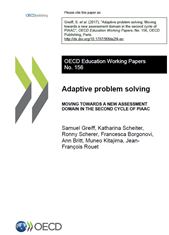 [Summary courtesy OECD] [Summary courtesy OECD]
Adaptive Problem Solving: Moving Towards a New Assessment Domain in the Second Cycle of PIAAC (Education Working Papers, No. 156)
The set of skills that is required to be a successful citizen in the 21st century is rapidly evolving. New technologies and social systems grow increasingly complex and require individuals to quickly and flexibly adapt to new and changing circumstances. This paper outlines the key features of the domain of adaptive problem solving that is proposed to be assessed in the 2nd cycle of the OECD Survey of Adult Skills (PIAAC), in addition to the domains of numeracy and literacy. Adaptive problem solving is considered to be a crucial 21st-century skill that combines cognitive and meta-cognitive processes. The paper develops a definition of adaptive problem solving, building on relevant work in cognitive psychology and cognitive science; introduces its covariates and preconditions; discusses relevant assessment principles; and provides insights on the relevance of adaptive problem solving for labour markets and social integration.
» Download the PDF
» OECD iLibrary
|
|
 [Summary courtesy OECD] [Summary courtesy OECD]
Youth in Transition: How Do Some of the Cohorts Participating in PISA Fare in PIAAC? (Education Working Papers, No. 155)
This paper uses data from PISA and the OECD Survey of Adult Skills (PIAAC) to examine the evolution of socioeconomic and gender disparities in literacy and numeracy proficiency [of respondents] between the ages of 15 and 27 in the sample of countries that took part in both studies.
» Download the PDF
» OECD iLibrary
|
|
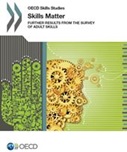 Skills Matter: Further Results from the Survey of Adult Skills (2016) Skills Matter: Further Results from the Survey of Adult Skills (2016)
This volume reports results from the 24 countries and regions that participated in the first round of the survey in 2011–12 (first published in OECD Skills Outlook 2013: First Results from the Survey of Adult Skills) and from the nine additional countries that participated in the second round in 2014–15 (Chile, Greece, Indonesia [Jakarta], Israel, Lithuania, New Zealand, Singapore, Slovenia, and Turkey). It describes adults’ proficiency in the three information-processing skills assessed, and examines how skills proficiency is related to labour-market and social outcomes.
» Download the PDF
» OECD iLibrary
» Access the tables and charts (Webpackages)
|
|
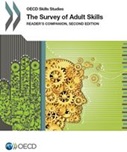 The Survey of Adult Skills: Reader’s Companion, Second Edition (2016) The Survey of Adult Skills: Reader’s Companion, Second Edition (2016)
The Survey of Adult Skills: Reader’s Companion, Second Edition, describes the design and methodology of the survey and its relationship to other international assessments of young students and adults. It is a companion volume to Skills Matter: Further Results from the Survey of Adult Skills.
» Download the PDF
» OECD ilibrary
|
|
 [Summary courtesy OECD] [Summary courtesy OECD]
Highlights from the U.S. PIAAC Survey of Incarcerated Adults: Their Skills, Work Experience, Education, and Training
On February 22nd, the American Institutes for Research hosted a presentation and discussion on a recently released report using data from the Programme for the International Assessment of Adult Competencies (PIAAC). This report provided information on skills and competencies of incarcerated adults, [and compared] to that of adults in US households. The report also reported on the extent of inmates’ participation in formal education, empowerment classes (such as parenting or personal finance management), and job training programs.
» Download the PDF
|
|
[Summary courtesy OECD]
 Measurement Properties of Non-cognitive Scales in the Polish Follow-up Study on PIAAC (POSTPIAAC) (Education Working Papers, No. 149) Measurement Properties of Non-cognitive Scales in the Polish Follow-up Study on PIAAC (POSTPIAAC) (Education Working Papers, No. 149)
There is a growing literature providing evidence that not only cognitive skills but also non-cognitive skills are important for economic and social outcomes. This paper assesses the measurement properties of the Big Five and Grit scales in a large representative sample of adults in Poland. The data from the Polish Follow-up Study on the Programme for International Assessment of Adult Competencies (postPIAAC) include longitudinal information on PIAAC respondents in Poland and additional background information not available in the international study.
» Download the PDF
» OECD iLibrary
|
|
 [Summary courtesy OECD] [Summary courtesy OECD]
Returns to ICT Skills (Education Working Papers, No. 134)
How important is mastering information and communication technologies (ICT) in modern labour markets? We present the first evidence on this question, drawing on unique data that provide internationally comparable information on ICT skills in 19 countries from the OECD Programme for the International Assessment of Adult Competencies (PIAAC). Our identification strategy relies on the idea that internet access is important in the formation of ICT skills, and we implement instrumental-variable models that leverage exogenous variation in internet availability across countries and across German municipalities. ICT skills are substantially rewarded in the labour market: returns are at 8% for a one standard- deviation increase in ICT skills in the international analysis and are almost twice as large in Germany. Placebo estimations show that exogenous internet availability cannot explain numeracy or literacy skills, suggesting that our identifying variation is independent of a person’s general ability. Our results further suggest that the proliferation of computers complements workers in executing abstract tasks that require ICT skills.
» Download the PDF
» OECD iLibrary
|
|
 [Summary courtesy OECD] [Summary courtesy OECD]
Working and Learning: A Diversity of Patterns (Social, Employment and Migration Working Papers, No. 169)
The combination of work and study has been hailed as crucial to ensure that youth develop the skills required [for] the labour market so that transitions from school to work are shorter and smoother. This paper fills an important gap in availability of internationally comparable data. Using the 2012 Survey of Adult Skills (PIAAC), it draws a comprehensive picture of work and study in 23 countries/regions.
» Download the PDF
» OECD iLibrary
|
|
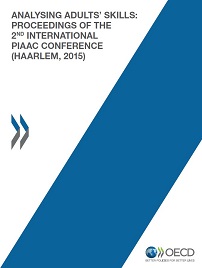 [Summary courtesy OECD] [Summary courtesy OECD]
Analysing Adult’s Skills: Proceedings of the 2nd International PIAAC Conference (Haarlem, 2015)
This volume collects a selection of papers from the 2nd PIAAC International Conference, jointly organised by the OECD and the Dutch government in November 2015 in Haarlem, the Netherlands. The three papers collected in this volume represent the work of scholars who were invited to present their work in the plenary session of the conference. The authors are all renowned scholars in their respective fields. Each of the papers represents an important contribution to the better understanding of issues of labour-market and education policy that are at the centre of the policy concerns of many governments.
» Download the PDF
|
|
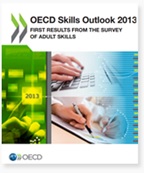 OECD Skills Outlook 2013: First Results from the Survey of Adult Skills (2013) OECD Skills Outlook 2013: First Results from the Survey of Adult Skills (2013)
The Survey of Adult Skills, a product of the OECD Programme for the International Assessment of Adult Competencies (PIAAC), was designed to provide insights into the availability of some of key skills in society and how they are used at work and at home. The first survey of its kind, it directly measures proficiency in several information-processing skills—namely, literacy, numeracy and problem solving in technology-rich environments. This first edition of OECD Skills Outlook reports results from the countries and regions that participated in the first round of the Survey of Adult Skills.
» Download the PDF
» OECD iLibrary
» Access the tables and charts (Webpackages)
|
|
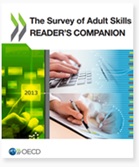 The Survey of Adult Skills – Reader’s Companion (2013) The Survey of Adult Skills – Reader’s Companion (2013)
This reader’s companion for the Survey of Adult Skills (PIAAC) explains what the survey measures and the methodology behind the measurements, provides content of the background questionnaires, examines the relationship between this survey and other skills surveys, as well the issues of ‘key competencies" and measurements of human capital.
» Download the PDF
» OECD iLibrary
|
|
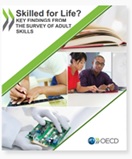 Skilled for Life? Key Findings from the Survey of Adult Skills Skilled for Life? Key Findings from the Survey of Adult Skills
A 32-page brochure presenting the key findings from the Survey of Adult Skills (PIAAC).
» Download the PDF
» See the Slideshare
|
|
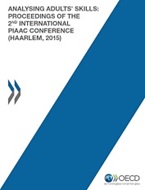 Analysing Adults’ Skills: Proceedings of the 2nd International PIAAC Conference (Haarlem, Working Papers 2015) Analysing Adults’ Skills: Proceedings of the 2nd International PIAAC Conference (Haarlem, Working Papers 2015)
This volume collects a selection of papers from the 2nd International PIAAC Conference, jointly organized by OECD and the Dutch government in November 2015 in Haarlem, the Netherlands. The three papers collected in this volume represent the work of scholars who were invited to present their work at the plenary session of the conference. The authors are all renowned scholars in their respective fields. Each of the papers represents an important contribution to the better understanding of issues of labour-market and education policy that are at the centre of the policy concerns of many governments.
» Download the PDF
|
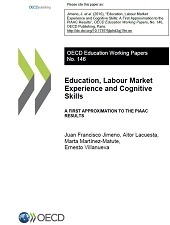 Education, Labour Market Experience and Cognitive Skills (OECD Education Working Papers, No. 146) Education, Labour Market Experience and Cognitive Skills (OECD Education Working Papers, No. 146)
This paper examines how formal education and experience in the labour market correlate with measures of human capital available in the Survey of Adult Skills, a product of the OECD Programme for the International Assessment of Adult Competencies (PIAAC). The findings are consistent with the notion that, in producing human capital, work experience substitutes for formal education at the bottom of the schooling distribution. First, the number of years of working experience correlates with literacy proficiency only among low-educated individuals. Secondly, low-educated workers who only perform simple tasks in their jobs (calculating percentages or reading e-mails) do better on numeracy and literacy tests than similar employees who do not perform those tasks. Thirdly, workers in jobs intensive in numeric tasks perform relatively better on the numeracy section of the PIAAC test than in the literacy part. Overall, our results suggest that the contribution of on-the-job learning to skills formation is about a third of that of compulsory schooling in most of the countries that participated in PIAAC.
» OECD iLibrary
|
|
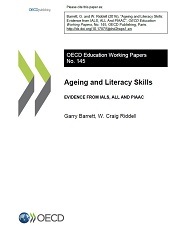 Ageing and Literacy Skills (OECD Education Working Papers, No. 145) Ageing and Literacy Skills (OECD Education Working Papers, No. 145)
This paper examines the relationship between age and literacy using data from the International Adult Literacy Survey (IALS), the Adult Literacy and Life Skills Survey (ALL), and the Survey of Adult Skills, a product of the OECD Programme for the International Assessment of Adult Competencies (PIAAC). A negative partial relationship between literacy and age exists, with literacy declining with age, especially after age 45. However, this relationship could reflect some combination of age and birth cohort effects. The analysis shows that in most participating countries, the negative literacy–age profile observed in cross-sectional data arises from offsetting ageing and cohort effects. With some exceptions, more recent birth cohorts have lower levels of literacy, and individuals from a given birth cohort lose literacy skills after they leave school at a rate greater than that indicated by cross-sectional estimates. The results for birth cohorts suggest that there is not a general tendency for literacy skills to decline from one generation to the next, but that the majority of the countries examined are doing a poorer job of developing literacy skills in successive generations.
» OECD iLibrary
|
|
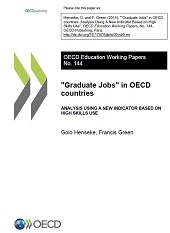 “Graduate Jobs” in OECD countries – Analysis Using a New Indicator Based on High Skills Use (OECD Education Working Papers, No. 144) “Graduate Jobs” in OECD countries – Analysis Using a New Indicator Based on High Skills Use (OECD Education Working Papers, No. 144)
A recurring issue for education policy-makers is the labour-market effect of the long-term global mass expansion of higher education, particularly on what are considered “graduate jobs.” The traditional assumption is that graduate jobs are virtually coterminous with professional and managerial occupations. A new indicator of graduate jobs, ISCO(HE)2008, is derived using task-based data drawn from the Survey of Adult Skills, a product of the OECD Programme for the International Assessment of Adult Competencies (PIAAC). The new classification shows that several jobs in ISCO major group 3 “Technicians and Associate Professionals” are also classed as graduate jobs in many countries. Altogether, 27.6 per cent of jobs are classified as graduate jobs in the 15 OECD country-regions for which we have data. Considerable variation in the proportion of graduate jobs is found across industries and countries, and in the short period since 2011, the proportion of graduate jobs has become more diverse across countries.
» OECD iLibrary
|
|
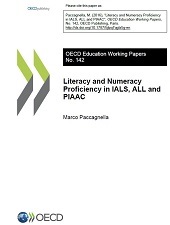 Literacy and Numeracy Proficiency in IALS, ALL and PIAAC (OECD Education Working Papers, No. 142) Literacy and Numeracy Proficiency in IALS, ALL and PIAAC (OECD Education Working Papers, No. 142)
This paper analyzes proficiency in literacy and numeracy in the countries that have participated in the International Adult Literacy Survey (IALS, administered between 1994 and 1998), the Adult Literacy and Life Skills Survey (ALL, administered between 2003 and 2007), and the Survey of Adult Skills (PIAAC, administered in 2012). While many countries experienced small to modest changes in literacy proficiency between IALS and PIAAC, others saw sizeable variations, mostly on the negative side.
» OECD iLibrary
|
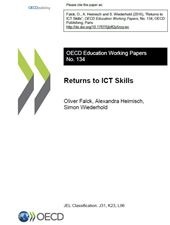 Returns to ICT Skills (OECD Education Working Papers, No. 134) Returns to ICT Skills (OECD Education Working Papers, No. 134)
How important is mastering information and communication technologies (ICTs) in modern labour markets? We present the first evidence on this question, drawing on unique data that provide internationally comparable information on ICT skills in 19 countries from the OECD Programme for the International Assessment of Adult Competencies (PIAAC). Our identification strategy relies on the idea that Internet access is important to the formation of ICT skills, and we implement instrumental-variable models that leverage exogenous variation in Internet availability across countries and across German municipalities. ICT skills are substantially rewarded in the labour market: returns are at 8 per cent for a one-standard-deviation increase in ICT skills in the international analysis and are almost twice as large in Germany. Placebo estimations show that exogenous Internet availability cannot explain numeracy or literacy skills, suggesting that our identifying variation is independent of a person’s general ability. Our results further suggest that the proliferation of computers complements workers in executing abstract tasks that require ICT skills.
» OECD iLibrary
|
|
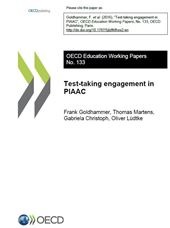 Test-taking engagement in PIAAC (OECD Education Working Papers, No. 133) Test-taking engagement in PIAAC (OECD Education Working Papers, No. 133)
In this study, we investigated how empirical indicators of test-taking engagement can be defined, empirically validated, and used to describe group differences in the context of the Programme for the International Assessment of Adult Competencies (PIAAC). The approach was to distinguish between disengaged and engaged response behaviour by means of response-time thresholds.
» OECD iLibrary
|
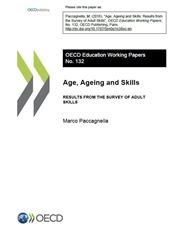 Age, ageing and skills – Results from the Survey of Adult Skills (OECD Education Working Papers, No. 132) Age, ageing and skills – Results from the Survey of Adult Skills (OECD Education Working Papers, No. 132)
This paper presents a comprehensive analysis of the link between age and proficiency in information-processing skills, based on information drawn from the Survey of Adult Skills (PIAAC). The data reveal significant age-related differences in proficiencies, strongly suggesting that proficiency tends to “naturally” decline with age. Age differences in proficiency are, at first sight, substantial. On average across the OECD countries participating in PIAAC, adults aged 55 to 65 score some 30 points lower than adults aged 25 to 34 on the PIAAC literacy scale, a difference only slightly smaller than the score-point difference between tertiary-educated and less-than-upper-secondary-educated individuals. However, despite their lower levels of proficiency, older individuals do not seem to suffer in terms of labour-market outcomes. In particular, they generally earn higher wages, and much of the available empirical evidence suggests that they are not less productive than younger workers. Older and more experienced individuals seem therefore able to compensate for the decline in information-processing skills by developing other skills, which are generally much more difficult to measure. On the other hand, proficiency in information-processing skills remains a strong determinant of important outcomes at all ages; it is therefore crucial to better understand which factors are the most effective in preventing such age-related decline in proficiency, which does not occur to the same extent in all countries and for all individuals.
» Adult Skills in Focus No. 3:
» OECD iLibrary
|
|
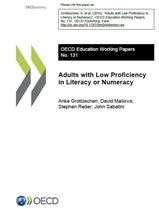
Adults with low proficiency in literacy or numeracy (OECD Education Working Papers, No. 131)
This report offers a comprehensive analysis of the information from the Survey of Adult Skills (PIAAC) regarding adults with low literacy and numeracy proficiency. The report describes the demographic and socioeconomic characteristics of these populations and explores the frequency with which they engage in reading, writing, and numeracy practices. Levels of engagement in these literacy practices are then related with a number of social and economic outcomes. Performance on the simple reading tasks (the so-called “reading components”) of adults with low proficiency is also analyzed, as well as their participation rates in formal or non-formal adult education or training programs.
Statistical Annex:
- Figures included in the Report and corresponding data
- Annex to Chapter 3 (Tables and Figures)
» Adult Skills in Focus n°2:
» OECD iLibrary
|
|
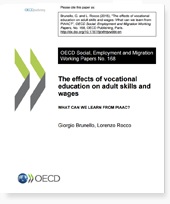 The effects of vocational education on adult skills and wages (OECD Social, Employment and Migration Working Papers, No. 168) The effects of vocational education on adult skills and wages (OECD Social, Employment and Migration Working Papers, No. 168)
Vocational education and training (VET) is highly valued by many. In 2010, the European Ministers for Vocational Education and Training, the European social partners, and the European Commission issued the Bruges Communiqué, which describes the global vision for VET in Europe 2020. In this vision, vocational skills and competencies are considered as important as academic skills and competencies. VET is expected to play an important role in achieving two Europe 2020 headline targets in education: (a) reduction in the rate of early school leavers to less than 10 per cent; and (b) increase in the rate of 30-to-40-year-olds having completed tertiary or equivalent education to at least 40 per cent. However, there is limited hard evidence that VET can improve education and labour-market outcomes. The few existing studies yield mixed results, partly due to differences in the structure and quality of VET across countries.
» OECD iLibrary
|
|
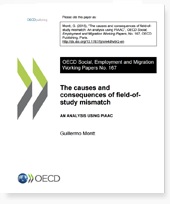 The causes and consequences of field-of-study mismatch – An analysis using PIAAC (OECD Social, Employment and Migration Working Papers, No. 167) The causes and consequences of field-of-study mismatch – An analysis using PIAAC (OECD Social, Employment and Migration Working Papers, No. 167)
Field of study mismatch occurs when workers educated in a particular field work in another. It is conceptually distinct from qualifications or skills mismatch, although a part of qualifications and skills mismatch results from graduates from a particular field having to downgrade to find work in another field. Some studies have identified labour-market dynamics related to field-of-study mismatch, but few (if any) have sought to directly understand the interplay between labour-supply factors (the types of skills brought to the workplace) and labour-demand factors (the types of skills sought by employers) in field-of-study mismatch. Using data from the Programme for the International Assessment of Adult Competencies (PIAAC) Survey of Adult Skills, this paper shows that although students may choose to specialize in a particular field, actually getting to work in that field is not solely up to them.
» OECD iLibrary
|
|
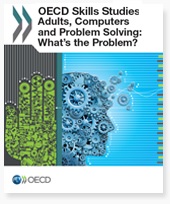 Adults, Computers and Problem Solving: What’s the Problem? (OECD Skills Studies) Adults, Computers and Problem Solving: What’s the Problem? (OECD Skills Studies)
This report provides an in-depth analysis of the results from the Survey of Adult Skills (PIAAC) related to problem solving in technology-rich environments, along with measures concerning the use of ICT and problem solving.
» Download the PDF
» OECD iLibrary
|
|
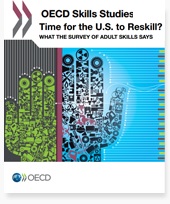 Time for the U.S. to Reskill? What the Survey of Adult Skills Says (OECD Skills Studies) Time for the U.S. to Reskill? What the Survey of Adult Skills Says (OECD Skills Studies)
Literacy and numeracy skills lie at the root of our capacity to communicate, live, and work together to develop and share knowledge. They matter for economic success and social well-being. This report draws on the new international OECD Survey of Adult Skills (PIAAC) to highlight the challenges faced by the US. It shows that the US should take action to improve adult skills if it wants to avoid falling behind other countries. The report also advances a set of key recommendations to improve basic skills across the board.
» Download the PDF
» OECD iLibrary
|